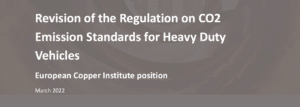The European Copper Institute (ECI) supports the EU’s climate ambitions for 2030 and
2050. Ambitious policies are needed to increase electrification, the deployment of renewables
and of energy efficiency measures to decarbonise the European economy, and in many
respects the ‘Fit for 55’ package proposals go in the right direction to facilitate this. Copper
makes a significant contribution to the clean energy transition as a sustainable raw
material that is needed to decarbonise the economy.
The fast development of battery technologies for passenger cars is enabling an acceleration in
the decarbonisation of heavy-duty vehicles (HDVs). Given the relatively low margins of HDV
fleet operators (around 3% of revenues), the key driver to shift operators to a zero-emission
(ZE) technology is the total cost of ownership (TCO). Once a ZE technology has a lower TCO
than vehicles fuelled by diesel, demand will pull the transition and OEMs manufacturing HDVs
will follow course. For this reason, in our view the ZE HDV uptake will be steeper than the
one for cars.
Battery technology is ready for this. In most cases, urban and regional HDVs (going back to
base everyday) using smart charging have a lower TCO than vehicles using diesel. This is also
likely to be the case for long-haul vehicles when they arrive on the market by 2024.
To better align the Regulation setting CO2 emission standards for HDVs with this dynamic, ECI
suggests the following changes to the current Regulation:
1. Introduce CO2 reduction targets for lorries and tractors of:
- 65% by January 2030 compared to 2019 (or 2020 depending when the
monitoring started) for those lorries and tractors in categories N2 and N3 of the European classification for vehicle categories that are currently included under
the CO2 monitoring and reporting requirements, and - 100% by January 2035 for all new registered lorries and tractors in categories
N2 and N3.
2. Include a ZEV mandate for busses and coaches of:
- 50% of new registered busses and coaches in categories M2 and M3 of the
European classification for vehicle categories to be zero-emission by January
2027, and - 100% of new registered busses and coaches in categories M2 and M3 to be
zero-emission by January 2030.
3. Mandate the European Commission to present a legislative proposal by December
2026 to set minimum well-to-wheel energy efficiency thresholds for HDVs.
Read the full brief

